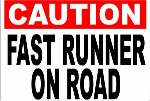
 Most of us would like to be able to run just that little bit faster. Improve on that 10k PB, even if it’s only by the smallest amount. Or maybe you’re trying to maintain the times you did when you were a bit younger? It’s not so easy once you hit 40 is it? Whatever your situation, there are plenty of simple things you can do to shave more than just a few seconds off your time. Here are six of them.
Most of us would like to be able to run just that little bit faster. Improve on that 10k PB, even if it’s only by the smallest amount. Or maybe you’re trying to maintain the times you did when you were a bit younger? It’s not so easy once you hit 40 is it? Whatever your situation, there are plenty of simple things you can do to shave more than just a few seconds off your time. Here are six of them.
1. Extend your sleep time.
We all know that chronic sleep deprivation causes you to function below par. For those of you with children, think back to when they were babies, and the permanent daze you were in. (Maybe you going through that now).
Sleep experts reckon seven to nine hours of sleep per night for adults is the right amount, whilst teens should be getting nine to ten hours a night. If you’re falling asleep before your head hits the pillow, and have to wake up to an alarm every morning, then you’re probably not getting enough sleep. If you take about 20 mins to travel to the land of nod, and wake up without an alarm, then you’re probably getting enough -as long as that is more than 7 hours a night.
Simply getting the right amount of sleep will improve your performance, but studies have shown that by taking it a step further and extending your sleep time to 10-11 hours a night over a period of several weeks, your performance will improve measurably.
How good is that? And don’t worry if you’re the type who tosses and turns the night before a big race worrying you will sleep through your alarm! The sleep you get the night before a race doesn’t have nearly as much impact on your performance as your penultimate night’s sleep does.
2. Lighten Up
You’ll go faster if you can lose a few of those extra kgs you’re hanging onto for that famine that never comes. As a rule of thumb, for every 1% loss of body mass – primarily as body fat-there will be an approximate 1% increase in running speed. If you’re looking at weight loss as a performance booster, don’t crash diet for two weeks before a race. Instead, gradually lose a few kgs at a rate of about 500gms a week. Dramatic weight loss may adversely affect not only your performance, but your health as well.
Let’s have a look at the maths.
Current Weight = 65kgs
10km time = 50 mins ie 5mins per km, or 12kms per hour
If you lose 1% body fat
weight loss = 650 gms – that’s not a heap in anyone’s book
10km time improves by 1% ie, 50 mins x 99%=49.5
So there you have it. A 30 second PB by losing 650 gms.
3. Make sure you have lightweight new(ish shoes)
The heavier your shoes, the slower you will run (see point 2), so going for a lighter weight model makes sense. Generally you will need to transition into lighter weight shoes over time to reduce your risk of injury.
Newer shoes could be slightly lighter as well – the older the shoe, the more chance it has to gather moisture. Buy 2 pairs of shoes you like, and keep one pair for a bit of dry weather training to wear them in, and for racing. Every little bit helps.
4. Let your body recover
Be sure to include plenty of recovery time in your training program. That means amount of time between training sessions, as well as including a recovery week every 3-5 weeks. It also means tapering before an event. As a rule of thumb, marathoners will start to taper 3 weeks out from an event, 2 weeks for half marathoners, maybe a week for 10ks, and anything shorter at least a few days to a week. That means reducing your mileage substantially, and listening to your body. If it’s telling you it’s tired, it is. Let it rest.
Other important recovery strategies are
massage – find someone who can give you a great sports massage, and also learn how to massage yourseslf
sleep – as discussed above
good nutrition – a good recovery drink after long runs which has electrolytes as well as a 3:1 or 4:1 carbohydrate to protein ratio. A diet rich in fruit and vegetables and unprocessed foods.
5. Good Hydration
Your performance can start to decrease when you lose as little as 1% of your body weight in fluids. That could be as little as 2 cups of fluid, depending on your body weight. It’s such an easy thing to rectify. Find out more about hydration for running performance.
6. Attention to detail
As well as paying attention to all of the above, be prepared on race day.
Try out a few pre-race breakfast strategies before race day so see what suits you best.
Try out your nutrition strategies for the race during training. Never take gels, chomps, sports drinks etc in a race that you haven’t already tried. You could find you’re making a pit stop at the loo. High concentrations of simple carbs can cause all sorts of intestinal upsets.
If your race is in the morning, get up early to train so that you are replicating race conditions as closely as possible
Know the course (or not, depending on your personality). For me, I look to know where I’m running, where the hills will be, where the drinks stations are, etc. Others don’t seem to mind, but if you’re like me, try to run over at least part of the course in training.
Don’t delay your training session if it happens to be raining when it’s scheduled. It might be raining on race day
Bring layers of warm clothes you can discard on race day. Keep them on even after you have entered the starting area. You could be waiting quite a while till you start.
Bring toilet paper with you. Bad enough to have to use a smelly port-a-loo if you have a last minute attack of nerves before the race, but VERY bad if you find an empty toilet roll holder!
DISCLAIMER: Any information contained in this document is obtained from current and reliable sources and is solely for the purpose of interest and information. Individuals receiving this information must exercise their independent judgment in determining its appropriateness for their particular needs. The information and training advice is general in nature and may not be suited to the recipient’s individual needs. Medical advice should always be sought when starting an exercise program. As the ordinary or otherwise use(s) of this information is outside the control of the author, no representation or warranty, expressed or implied, is made as to the effect(s) of such use(s), (including damage or injury), or the results obtained. The author expressly disclaims responsibility as to the interpretation of the views contained in this article, ordinary or otherwise. Furthermore, the author shall not be liable for any errors or delays in the content, or for any actions taken in reliance thereon. The author shall not be responsible for any damages resulting from use of or reliance upon this information. Readers of this document are solely responsible for compliance with all laws and regulations applying to the use of the information, including intellectual property rights of third parties.


